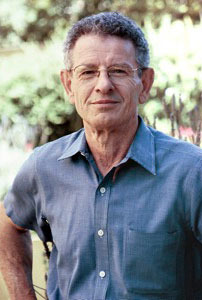
Marcus W. Feldman
Professor, Department of Biological Sciences; Director, Morrison Institute for Population and Resource Studies; Wohlford Professor, School of Humanities and Sciences, Stanford University
Marcus Feldman will present on his genetic research, journeys back in time through the contemporary human genome to study patterns of human genomic variation around the world, as well as discuss the need for redefining “race.”
Marcus Feldman was born and raised in Perth, Australia, the son of Simon and Ida Feldman. Although both of his parents encouraged him to follow his own interests and passions, his father, an engineer, liked math and before long young Marcus had picked up the penchant. “He was happy that I did,” recalls Feldman.
It was anything but a passing fancy. At the University of Western Australia, Feldman first earned his bachelor of science degree in 1964, then just two years later, his master of science in mathematics from Monash University in Australia. From there, he ventured to the United States to get his doctorate in mathematical biology at Stanford University, after which he returned to Australia where he had accepted a teaching position at La Trobe University in Melbourne.
Two years later, however, Feldman was back in California, joining Stanford’s biology faculty in 1971. There, he began using applied mathematics and modeling to study evolutionary phenomena. With L.L. Cavalli-Sforza in 1973, he originated the quantitative theory of cultural evolution, initiating a research program in cultural transmission and gene-culture coevolution. The efforts started the subdiscipline of cultural anthropology, also known as coevolution, gene-culture evolution, cultural transmission theory, and dual inheritance theory.
The landmark work that ensued used models from population genetics to investigate the spread of culturally transmitted units. When Cultural Transmission and Evolution: A Quantitative Approach was published in 1981, it inspired new research into the correlation of patterns of genetic and cultural dispersion.
His own research into human molecular evolution for the Morrison Institute for Population and Resource Studies has investigated issues concerning the history of today’s modern humans. Feldman has, for example, conducted important demographic work on trends important to humanity’s future, including a large research program investigating the imbalance in the sex ratio in China (The Man-ning of China). In collaboration with Chinese demographers, he is computing numbers that clearly show an impending overpopulation of males, which could be disastrous.
Feldman’s specific areas of research include the evolution of complex genetic systems that can undergo both natural selection and recombination, the evolution of modern humans using models for the dynamics of molecular polymorphisms, especially DNA variants, and the evolution of learning as one interface between modern methods in artificial intelligence and models of biological processes, including communication. He is the author of more than 400 scientific papers and six books on evolution, ecology, and mathematical biology, adding significantly to the greater database over the years.
In 2003, his work received the “Paper of the Year” award for biomedical science from the prestigious medical research journal The Lancet.
Feldman is now working on three books—on gene-culture coevolutionary theory, niche construction in evolutionary biology, and the sex-ratio issue in China—and also serves as academic director of Bridging the Rift, a project to develop collaborations between Israeli and Jordanian scientists. In addition to his teaching, research, writing, and directing, he is managing editor of Theoretical Population Biology and associate editor of Genetics, Human Genetics, Annals of Human Genetics, Annals of Human Biology, and Complexity. He is a former editor of The American Naturalist.Feldman is a member of the The American Society of Human Genetics and a Fellow of the American Academy of Arts & Sciences and of the California Academy of Sciences. The Hebrew University of Jerusalem has awarded him an honorary doctorate of philosophy and Beijing Normal University and Xi’an Jiaotong University have each appointed him honorary professor.